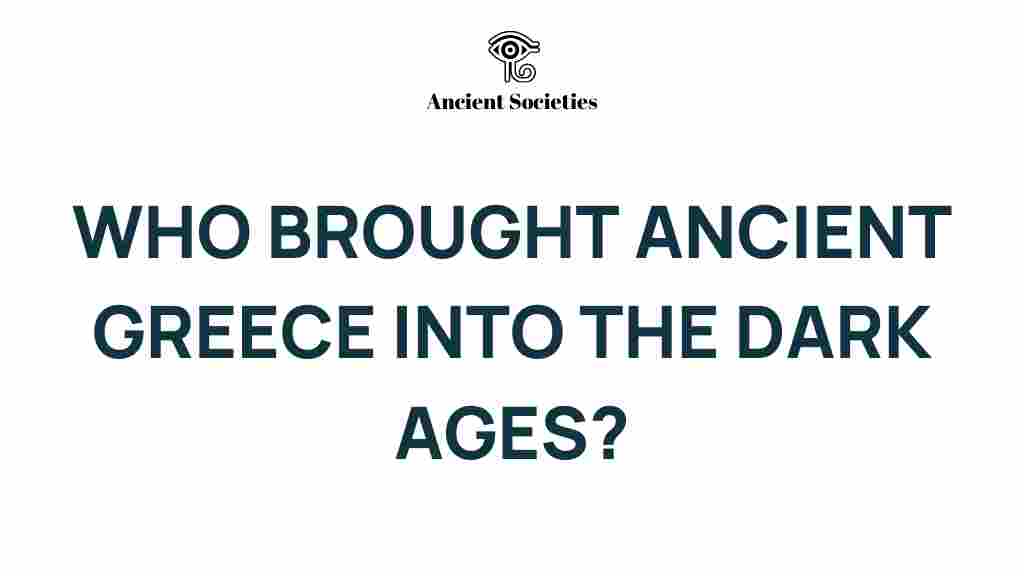Who Pushed Ancient Greece into the Shadows of the Dark Ages?
The transition from the vibrant civilization of Ancient Greece to the obscurity of the Dark Ages is one of the most fascinating periods in history. This profound shift raises numerous questions about the causes and consequences of such a decline. In this article, we will explore the factors that contributed to the fall of Ancient Greece, the ensuing Dark Ages, and the impact on society and culture. By examining archaeological findings and historical accounts, we aim to unravel the mystery behind this transformative era.
The Glory of Ancient Greece
Before delving into the decline of Ancient Greece, it is essential to understand the civilization’s achievements. Ancient Greece is renowned for its contributions to philosophy, art, politics, and science. Key highlights include:
- Philosophy: Thinkers like Socrates, Plato, and Aristotle laid the foundations of Western philosophy.
- Art and Architecture: The Parthenon and sculptures exemplified the excellence of Greek art.
- Democracy: Athens introduced the concept of democracy, influencing political systems worldwide.
- Science: Pioneers like Archimedes and Hippocrates advanced knowledge in mathematics and medicine.
Ancient Greece was a beacon of culture and intellect, thriving from around the 8th century BC until approximately the 4th century BC. However, this era of brilliance eventually gave way to a time of decline.
The Onset of the Dark Ages
The term “Dark Ages” refers to the period roughly between 500 AD and 1000 AD, characterized by a significant decline in cultural and economic activity in parts of Europe, particularly in Greece. But what caused this decline? Several key factors played a role:
- Invasions: The invasions by various groups, such as the Goths and later the Slavs, resulted in the destabilization of Greek city-states.
- Economic Decline: Trade routes were disrupted, leading to a decrease in commerce and economic activity.
- Political Fragmentation: The fall of centralized power in city-states led to local warlords taking control, resulting in chaos.
- Natural Disasters: Earthquakes and famines may have contributed to agricultural decline.
These events collectively pushed Ancient Greece into the shadows of the Dark Ages, marking a significant transformation in society and culture.
Decline of Society and Culture
As the Dark Ages set in, the vibrant society of Ancient Greece began to fracture. The once-flourishing cities became isolated, leading to several notable changes:
- Loss of Literacy: The ability to read and write diminished, as education systems collapsed.
- Decline of the Arts: Artistic expression suffered, with fewer monumental structures and artworks created.
- Religious Changes: The decline of polytheistic practices saw the rise of Christianity, which altered the cultural landscape.
This decline wasn’t uniform across all regions; some areas experienced different rates of decline or even localized growth. However, the overall trend was one of regression, pushing Ancient Greece into obscurity.
Archaeological Evidence of the Decline
Archaeology provides crucial insights into this period of decline. Excavations have uncovered artifacts that tell the story of a civilization in transition. Some key findings include:
- Pottery Styles: The transition from intricate designs to simpler forms indicates a loss of artistic skill.
- Settlement Patterns: Abandoned cities and a shift to rural living show societal changes and a breakdown of urban centers.
- Burial Practices: Changes in burial customs reflect shifts in religious beliefs and social structures.
These artifacts not only showcase the decline of Ancient Greece but also highlight the mysteries surrounding this transformative period. For more information on archaeological findings, you can visit this resource.
Survival and Adaptation
Despite the decline, not all was lost. Some elements of Ancient Greek civilization persisted through the Dark Ages:
- Oral Traditions: Stories and legends were passed down orally, preserving cultural elements.
- Christian Influence: As Christianity spread, it absorbed aspects of Greek culture, keeping some traditions alive.
- Byzantine Continuity: The Eastern Roman Empire, or Byzantine Empire, continued many Greek practices and philosophies.
These aspects demonstrate the resilience of Greek culture, even as it faced significant challenges. The transformation during the Dark Ages was not a complete erasure but a complex adaptation.
The Mystery of the Dark Ages
The decline of Ancient Greece and the emergence of the Dark Ages remain partially shrouded in mystery. Many scholars continue to debate the exact causes and implications of this transformation. Some questions that linger include:
- What was the role of climate change in the collapse of agricultural systems?
- How did the socio-political structures contribute to the fragmentation of society?
- What can we learn from the resilience of cultures during periods of decline?
Understanding the Dark Ages requires a multifaceted approach, considering various factors that influenced the fate of Ancient Greece.
Conclusion
The transition from Ancient Greece to the Dark Ages represents a complex narrative of decline, resilience, and mystery. While the civilization that once shone brightly dimmed under the weight of invasions, economic turmoil, and political fragmentation, the remnants of its culture continued to influence the world. Through archaeological discoveries and historical analysis, we can piece together the story of this remarkable civilization and its enduring legacy.
As we study this period in history, we are reminded of the fragility of civilization and the enduring spirit of culture. The lessons learned from Ancient Greece’s decline can inform our understanding of contemporary society and the challenges it faces. For those interested in exploring more about the intricacies of ancient civilizations, check out this informative link.
In conclusion, the journey from Ancient Greece to the Dark Ages is not just a tale of decline but also one of survival and adaptation, filled with lessons and mysteries that continue to captivate historians and enthusiasts alike.
This article is in the category History and created by AncientSocieties Team
